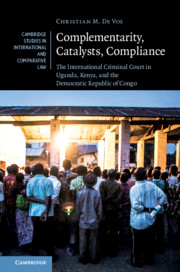 Complementarity, Catalysts, Compliance
Complementarity, Catalysts, Compliance Domestic Courts and Complementarity
from Part II - The ICC in Uganda, Kenya and the Democratic Republic of Congo
Published online by Cambridge University Press: 16 April 2020
This chapter examines the emergence of specialized domestic courts as a frequently cited outcome of ICC interventions. It highlights the shifting, adaptive nature of complementarity as the basis for reforming domestic judicial systems, even though the link between these efforts and the ICC itself is often tenuous. The chapter highlights how, in contexts like Uganda and Kenya, the threat of the ICC’s jurisdiction was used to prompt the setting up of domestic legal bodies and to buttress putative admissibility challenges. By contrast, recent descriptions depict these bodies more literally as extensions of the ICC: Rather than displacing the court, they are meant to complement and ‘complete’ its work. Non-state actors in the Democratic Republic of Congo have invoked complementarity in a similar manner, even though the domestic proceedings there through military courts are not materially connected to - nor the direct result of - the ICC’s undertakings. In tracing these shifts, the chapter considers complementarity’s duelling impulse towards conformity (specialized domestic courts often mimic the ICC) and competition (such courts are often in tension with the ‘ordinary’ justice system). I also suggest the concept of a ‘justice meme’ to understand how the perceived need for conformity with ICC practice is transmitted and replicated.
To save this book to your Kindle, first ensure [email protected] is added to your Approved Personal Document E-mail List under your Personal Document Settings on the Manage Your Content and Devices page of your Amazon account. Then enter the ‘name’ part of your Kindle email address below. Find out more about saving to your Kindle.
Note you can select to save to either the @free.kindle.com or @kindle.com variations. ‘@free.kindle.com’ emails are free but can only be saved to your device when it is connected to wi-fi. ‘@kindle.com’ emails can be delivered even when you are not connected to wi-fi, but note that service fees apply.
Find out more about the Kindle Personal Document Service.
To save content items to your account, please confirm that you agree to abide by our usage policies. If this is the first time you use this feature, you will be asked to authorise Cambridge Core to connect with your account. Find out more about saving content to Dropbox.
To save content items to your account, please confirm that you agree to abide by our usage policies. If this is the first time you use this feature, you will be asked to authorise Cambridge Core to connect with your account. Find out more about saving content to Google Drive.